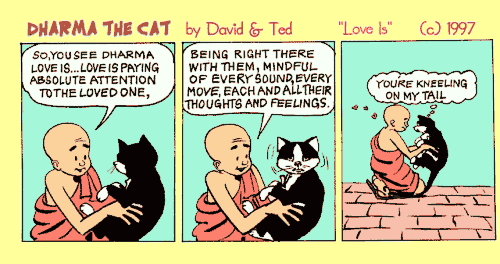
In 1980, the average American CEO's income was 40 times higher than that of the average worker. Today, it is well over 300 times higher.
A new study suggests this rising income inequality in the United States doesn’t just affect Americans’ pocketbooks; it affects their happiness. Over the past four decades, according to the study, the American people have been the least happy in years when there was the widest gap between rich and poor.
The above quote is taken from a recent article in Yes! Magazine, a longtime favorite of mine. Clearly, it's pointing to the level of economic injustice here in the States, the negative impact of which is definitely growing almost by the minute. The Buddha routinely spoke of the three poisons: greed, hatred, and ignorance. And there's little doubt in my mind that the kinds of material disparities we are now seeing are evidence of those poisons in action. All of them.
Hatred, you might be saying? Well, I say yes. Hatred too. Hatred of community. Of what sharing with your neighbors actually means (that we're interdependent and need each on some basic levels). Hatred of poor people, coupled with a fear of becoming "one of them." The list goes on and on.
It's not hard for me to locate the three poisons in either the workings of our economic system, or the beliefs that help drive it. In fact, it's rather too easy. So, let's consider something else in relation to the quote above.
The very linking of one's happiness to material wealth, or lack there of, is at least in part, an acting out of the three poisons as well. Having had our minds colonized by the narratives of consumerism, global capitalism, and the "American Dream," most of us struggle to detach our well being from money, material possessions, and social status derived from job, money, and possessions. The hundreds and even thousands of hours of absorbing advertisements, corporate-driven media news, and corroborating messages from family, friends, and co-workers has left many of our brains swamped in poisons, to the point where some folks can't distinguish themselves anymore.
You may have noticed a rise in popularity over the past decade or so of "zombie" narratives. Movies, novels, faux documentaries, songs - all with zombies at the center. There are many ways to read this phenomenon, but I believe one way to read it is to see how the zombies are, in many ways, forms of "us." An end point, if you will, of the colonization process spoken about in the last paragraph.
And if you think about it, Buddha's teachings - and all great spiritual teachings - have really been about decolonization. Breaking the stranglehold of whatever narratives hold sway for someone personally, as well as those narratives that hold sway over people collectively. Buddha's break with the caste system is an easy example of the latter.
On the flip side, there is also some truth to this linking of happiness (or contentment) with material position. Going without food, clothing shelter, decent health care, safe work conditions, any significant time off from work, and numerous other things are clearly becoming more commonplace amongst Americans. And frankly, it's tough to locate happiness, joy, contentment, or equanimity within those conditions. I fully believe that it's possible to both turn any situation into an opportunity to practice, to find peace and liberation - and, at the same time, to recognize that some conditions are flat out unjust, and worthy of being targets for transformation on a collective scale. In other words, I can choose to place the palette of miserable emotions I might have around economic injustice at the center of my spiritual practice, and at the same time work towards an end of that injustice in whatever ways I (alone and with others) can. And in doing so, might be able to locate happiness, joy, and even liberation in the now, while also honoring the struggles that continue to plague the community, nation, and the world even.
*Image Corporate Wealth Games
by nocwg2010
http://www.flickr.com/photos/48202244@N06/4417197746

